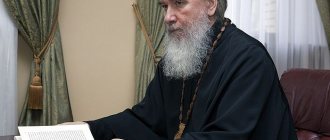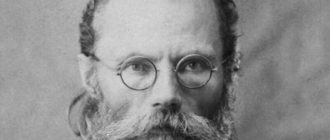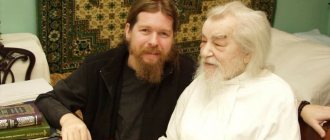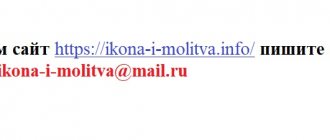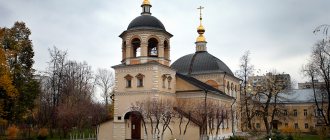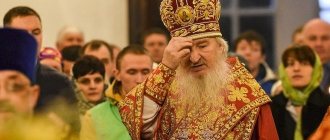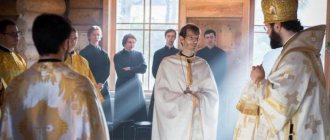Theological courses
Brothers and sisters
, The Church is the army of God in the fight against the forces of evil.
And every Christian must, as a warrior of Christ, tirelessly fight on His side. What does it mean to fight? This means fighting thoughts and passions inside one’s own heart, as well as resisting the devil in practice, that is, when a thought has already defeated a Christian, but he is struggling with his last strength, trying to avoid falling and sin. The Church calls itself “militant”
.
We liken ourselves to an army, and in sacred tradition there are quite a lot of epithets that indicate that we are at war. The Apostle Paul says: “Our struggle is not against flesh and blood, but against the spiritual forces of wickedness in high places.” This war is being waged both on the personal front and in an organized manner. Therefore, it can be said that the Church is like an army in a spiritual sense. And all soldiers act according to the regulations. The Orthodox Church has a Divine Service Charter - Typikon. During Lent, we advise you to carefully read it in order to live “without deviating from it and without adding anything of yourself to it.” We have prepared for you “Guidelines for lay people present at worship
.
These are the canonical rules
of the Orthodox Church regarding the participation of the laity in public worship, describing: - entrance to the temple; - entering the temple; - the beginning of your prayer; — hierarchy of the Russian Orthodox Church, forms of appeal to the clergy, clergy and laity; - behavior in church (is it possible to walk around the church during the service, venerate icons, light candles, talk); - general instructions about worship; - worship at every divine service; - exclamations of the priest and deacon; - worship during the all-night vigil; - worship during the liturgy; - blessing of the priest; - exit from the temple.
Read:
A Guide for the Laity Present at Worship
In 1958, Bishop Averky (Taushev), a theologian and spiritual writer, author of a well-known guide to the study of the Holy Scriptures and other works, began publishing “Questions and Answers” with the subtitle: “In Explaining Church Piety and counseling"
.
The purpose of this work is to distract people from trying to resolve questions that arise in the area noted above, with their own understanding and following the judgments of current literature, imbued with a spirit of inquisitiveness - without first understanding what answers the Holy Church gives to these questions. This is exactly what the reader finds in this section: information about how the Holy Church views this or that issue. After all, even people who habitually attend divine services and consider themselves part of the church people, sometimes do not have experienced knowledge of the church. This undertaking will definitely benefit a big cause: the ecclesiasticalization of life
.
More than two hundred
vital questions that necessarily arise before all Orthodox Christians: - is there a church rule obliging men to stand on the right side and women on the left in church? — Should there be seats in Orthodox churches? - What is the significance of priestly vestments of different colors? - Can the laity stand with lit candles while reading the Gospel? — Is it possible to follow the Divine Service using your own prayer book? - If the Orthodox faith is true, can others be saved? - When is a woman not allowed to visit the temple? — when does the light go out at the all-night vigil and Divine Liturgy? — where should icons be placed in residential buildings? — Is it necessary to be baptized with a bow after each petition at the litany? — is only one confession without communion acceptable in church practice — why does the Orthodox Church strictly prohibit marriages with non-Orthodox people? — what sins are meant by the sin “against the Holy Spirit”? — when and what kind of bell ringing is required for different services? — is it possible to celebrate TWO new years?
These and other questions were not specially invented by the bishop, but were taken from his pastoral life. Surely you will find the answers you need for yourself.
Read:
Questions and answers to explain church piety and spiritual care
Movement of Evangelical Churches of Europe
Opportunities for studying theology in Russian in Europe and the CIS countries. Full-time, part-time and distance learning via the Internet.
American school (one of the 5 best accreditations), located in Austria in Haligenkreuz near Vienna. Training takes place in Russian, Czech, Polish, Romanian, Hungarian and English. All teachers (from the USA and Europe) have doctoral degrees. Part-time and part-time training. Degrees (Certificate, Master of Arts - MA, Master of Divinity - MDiv). You choose your own training period. For example, to obtain a Master of Arts degree, you must pass 16 subjects. Each subject requires 3 months of independent preparation: reading material and writing papers. As well as 1 week of face-to-face session with a teacher and a final exam. Thus, if you take 4 courses per year, then after 4 years you will receive a diploma (if you successfully complete the courses and defend your thesis). Training can be extended up to 10 years. In-person sessions are held in Austria, as well as in branches of Eastern Europe: in Ukraine, Russia, Moldova, the Czech Republic, Poland, Romania, other countries and the Baltic countries.
The seminary has extensive experience in teaching via the Internet. It has a state license and is recognized by a number of accreditation organizations. Classes are held entirely remotely according to an individual schedule. Exams via Skype. The courses were prepared by leading specialists of the Russian ECB Union using the most current theological materials. Possibility of obtaining a Bachelor of Theology degree.
Online learning at TVSeminary is based on video lectures. You will feel like you are sitting at a desk in a classroom with the best teachers from leading seminaries and universities in the world! Get a Video Seminary Bible education at your own pace with TVSeminary video courses available online! Virtual classrooms Holy Trinity Video Seminaries are open around the clock to anyone who wants to grow and develop. The seminary offers the possibility of certification and obtaining a diploma to everyone who wants to confirm their acquired knowledge and skills.
Online Christian Education is the future of distance Christian education!
Moody Bible Institute is known for its service to Jesus Christ, its responsibility to His church, and its helping people study the Bible. We are especially pleased to collaborate with Bible Mission, which has the same goals. Together we want to support you in your pursuit of a deep knowledge of God through His Word.
The opening of such a school was made possible thanks to the prayers of many people, not only our employees, but also those who support this ministry financially. We hope your studies bring you great blessings.
ZBS Information Brochure
We do not teach students or issue diplomas. We develop training courses that are used by Bible colleges and seminaries around the world. We provide the same materials free of charge to users of our website. We also offer assistance to educational institutions and churches in preparing their curriculum based on our materials.
On our website you will find video and audio study guides, audio sermons and lectures, lesson texts, books, magazine articles, answers to a wide range of questions, as well as special sections on the letters of Paul and worship. Materials are divided into the following media categories: video, audio, texts. All these materials are systematized by topic. Our search system allows you to find the information you are interested in by such parameters as category, author, teacher, subject, series, word.
It prepares missionaries, pastors, music and children's ministers, and organizers of new churches, providing higher theological education. Offers European churches students prepared for practical ministry, for short and long-term missions, as well as the opportunity to train your ministers. There is also the opportunity to study in a master's program based on SEBTS. facebook.com/ubts.org.ua Email address is protected from spambots. Javascript must be enabled in your browser to view the address.
Bachelor's degrees at this university are offered in areas such as pastoral theology, missions, social work, and business administration. Master's degrees can be obtained from this university in areas such as counseling, social work, and practical theology. Studying for the bachelor's program is full-time. Students live in the university dormitory. Since its inception (founded in 1993), this educational institution has trained more than 1,200 specialists in the above fields from 15 countries. The graduates come from 35 nationalities and ethnic groups. The university has international accreditation from the Euro-Asian Accreditation Association (EAAA). University address: Universitatea Divitia Gratiae, Alexandru Hâjdeu, 94, MD-2001, Chișinâu. Phone: + 373 22 541357, +373 22 549832, +373 22 541030. E-mail: The e-mail address is being protected from spambots. To view the address, your browser must have Javascript enabled. Website: www.uni-dg.md. Facebook: www.facebook.com/uniDG
Institute of Church Ministry in collaboration with Horizon International schools. They offer online training based at the local church. The Institute always strives to help establish churches so that mature congregations can plant new churches.
Scandalous report
Elena gained wide fame by becoming the host of the Spas channel. The socio-political talk show “To the very essence” is regularly broadcast here. In each episode of the program, with the help of invited experts, the journalist covers serious problems of modern society. Here are some interesting programs, the names of which already speak about the fascinating content: “When is alms harmful?”, “Married to an unbeliever”, “Spiritual appearance of the Ukrainian elites”, “Voice of the Patriarch in the world”, “Magic and Orthodoxy”, “You are animals , gentlemen!
In addition to preparing reports for her own project, Elena closely monitors the activities of other journalists. If the work evokes a desire to comment, Zhosul does not stand aside. Anna Popova's article about Orthodox dating clubs became scandalous. The candidate of political science, who devoted many years to the religious topic, pointed out factual errors, a biased view of the situation and a desire to portray believers in an unflattering light.
A professional journalist, according to the TV presenter, should not allow inaccuracies in the presentation of the topic and an attitude that is offensive to other people.
Elena gladly takes part in other programs and gives interviews. Zhosul gave one of these for the Russkiy Mir TV channel. An episode of Irina Breusova’s program “Russian Women” was aired here. The conversation turned out to be intense, and therefore received a lot of enthusiastic responses.
Due to her active position on many issues, broad outlook and kind heart, Elena Zhosul, whose biography is incredibly interesting, is becoming popular. It is noteworthy that the TV presenter herself does not strive for fame, but silently does her job. Original TV reports are skillfully combined with public activities. In addition, Zhosul is a churchgoer, observes fasts and attends church services.
Department of Interdiarchal Distance Education, uniting the education departments of the Russian Orthodox Church of Kazakhstan, Siberia and the Far Eastis an educational institution for the laity, built on the principles of DISTANCE LEARNING, which is designed to give students complete knowledge in the scope of the theological seminary course.
The purpose of Distance Learning is:
Acquisition of systematic knowledge about the Orthodox faith by parishioners and employees of churches of the Russian Orthodox Church.
Providing teachers of secular - higher and secondary - educational institutions with a powerful tool for educating young people and reliable knowledge about Orthodox culture.
Assistance to rectors of Orthodox churches in training their own personnel, Orthodox missionaries and teachers of church disciplines for Sunday schools in parishes.
Helping students of correspondence departments of Orthodox theological seminaries organize their studies in a quality manner and gain deep, comprehensive knowledge.
Training period:
Two years – for those wishing to obtain basic knowledge about Orthodoxy (with the award of a certificate).
Plus four years - for people who have completed the basic course and whose goal is to obtain in-depth knowledge with their subsequent application in missionary work (with the awarding of a diploma).
Students of the Distance Learning department can be persons of the Orthodox faith aged from 18 to 60 years.
Those who successfully complete the Distance Learning department will be able to become catechists, missionaries, teachers of the Law of God, Church Slavonic language, dogmatic theology, church historical disciplines in Sunday schools and in theological courses at Orthodox parishes.
Since the main task of the MPPC is the churching of students, the distance learning system assumes the active participation of our students in the parish life of the churches near which they live.
Principles of distance learning:
Training is conducted remotely via the Internet, without traveling to the educational institution.
At the end of the initial and full courses, an on-site examination session is provided.
Distance courses provide a full study of materials in the scope of a theological seminary course
Duration of training is two + four years. The academic year is divided into two semesters, each of which is divided into seven three-week sections-lessons. Between semesters there are winter and summer holidays.
During the training, subjects such as the New Testament, Old Testament, Catechism, Liturgics, Liturgical Rules, History of the Russian Orthodox Church, General History of the Church, Church Slavonic Language, Dogmatic Theology, Sect Studies, Comparative Theology, etc. will be studied.
The educational process consists of: studying lesson materials prepared by our teachers, using a library with specially selected literature, completing tests that are assessed by teachers, participating in joint group work (the whole group responds to a given topic), participating in colloquiums (conversation-survey teacher of the whole group live), passing exams at the end of each semester.
There is an opportunity to ask questions to the priest.
TRAINING IS FREE.
Students who successfully complete their studies and pass exams receive a DIPLOMA.
Additional information for those wishing to enroll in the Distance Learning Department can be found in the APPLICANTS section.
